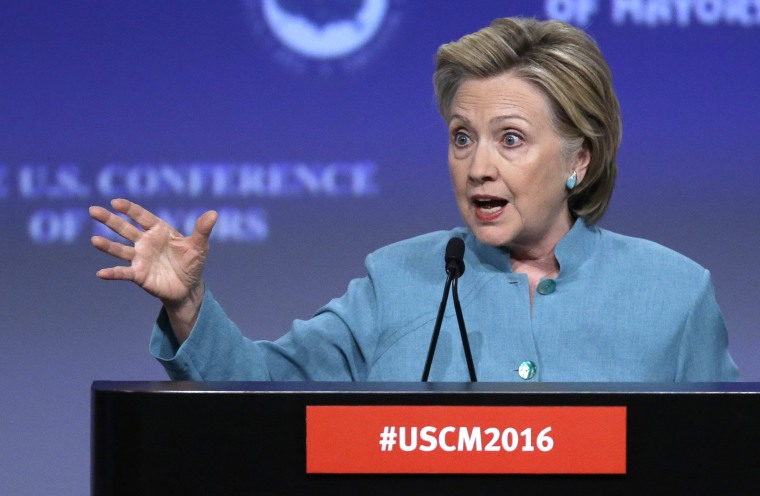Every day seems to bring fresh polls showing Hillary Clinton’s lead expanding over Donald Trump and new examples of Republicans defecting from their party's presumptive nominee. Trump’s dramatically behind Clinton in fundraising, organization and staffing. Analyst Nate Silver gives Clinton a 79 percent chance of winning the election.
Is there such a thing as too much good news? There can be if it makes Democrats cocky or stops donors from thinking the campaign needs their money.
“The No. 1 concern that Democrats should have is complacency,” said Brian Fallon, Clinton’s press secretary. “Donald Trump reminds us every day why he's uniquely disqualified to be commander in chief, but the reality is this race is bound to be very close all the way to end.”
Related: Clinton Maintains Edge in New NBC Battleground Map
If it seems too good to be true, it probably is -- especially for the Clintons, who seem to have a knack for snatching defeat from the jaws of victory (see: Bill Clinton’s unforced error in meeting with Attorney General Loretta Lynch this week).
So Clinton’s team is trying to tell her supporters -- and themselves -- to brace for inevitable downturns, keep an even keel and work like they’re already behind.
John Podesta, the campaign's chairman, recently addressed his staff to remind them not to get overconfident. “Donald Trump is not a serious man, but he is a serious candidate,” Podesta told his troops, according to a campaign official, who said the phrase has become a Podesta mantra.
Massachusetts Sen. Elizabeth Warren put it more bluntly during a recent visit to Clinton’s campaign headquarters in Brooklyn. “Don’t screw this up,” she warned staff.
The campaign has already sounded the alarm on small-dollar donations falling short of expectations, even as they dramatically outspend Trump.
Campaign manager Robby Mook has also been driving the point home in meetings with Democrats across the country, including at a summit last Friday with Vermont’s delegation to the Democratic National Convention.
And campaign surrogates have been told to respond to any question about Clinton’s polling lead by saying the race will end up being close, no matter what the polls say now.
“There are only two ways to run: unopposed and scared. Unless Trump drops out of the race, I'm running scared,” said Paul Begala, a former Bill Clinton adviser who now works with the pro-Clinton super PAC Priorities USA Action.
“The truth is, Trump's voters are reliable. They are old, angry white dudes. All they do is complain about their prostates and vote. Our voters are much harder to find, then register, then motivate, then deliver to the polling place,” Begala said. “Man, I am so far from complacent, I couldn't find it with Google Maps.”
Clinton’s presidential campaign in 2008 -- at least before her loss in Iowa -- is a case study in how overconfidence can lead to poor judgment and missed cues from the electorate.
She faced a similar challenge in the early days of the 2016 Democratic primary, when Vermont Sen. Bernie Sanders looked for a time like a harmless token opponent.
This time, officials said they were going to fight for every vote during the primary and take nothing for granted, repeating that line so often that some reporters wondered if aides were trying to convince themselves as much as the press. Either way, it paid off, earning Clinton the presumptive nomination.
Now facing Trump, it’s not just Clinton’s staff and allies who need to be braced for bumps in the road, but also rank-and-file Democrats, whose small donations help fund the campaign and whose anxiety influences the mood of electorate.
Related: How Donald Trump Walked Away From Millions of Dollars
In emails to supporters, campaign officials have been reminding supporters to keep their guard up.
“No matter what the collective wisdom of our political punditry has to say between now and November, Donald Trump has a real chance of winning this election,” Christina Reynolds, the campaign’s deputy communications director wrote last week. “Together, we have to wrap our minds around that fact -- and resolve to act on it.”
It’s not uncommon for campaigns to play to supporters’ fears in fundraising solicitations. President Obama’s email with the subject line “I will be outspent” was one of the most successful of his 2012 campaign.
But taking victory for granted is a real problem, which can lead to depressed fundraising, volunteering and ultimately turnout.
Many analysts blamed complacency among Clinton supporters for her stunning loss to Sanders in Michigan’s primary, for instance. Polls showed Clinton so far ahead, supporters might have figured they didn’t need to vote.
Ahead of other primaries, Clinton aides privately prayed for polls showing Sanders within reach in order to keep supporters engaged and the media’s expectations in check.
Now, with Clinton dominating Trump’s fundraising so thoroughly, the campaign has struggled to get its own supporters to feel the need to pony up.
Mook emailed supporters Wednesday under the subject “setback” to say the campaign was 130,000 donations short of its end-of-the-month goal.
“This goal isn’t some kind of generic oh-it-would-be-nice-to-get-there sort of thing,” Mook continued. “This is about actual projections and budget decisions: If we don’t raise what we thought we would for June before tomorrow at midnight, we’re going to have to make some difficult calls about where our funding goes in key battleground states, whether to hire more organizers or cut back, or whether to set up that next field office.”

